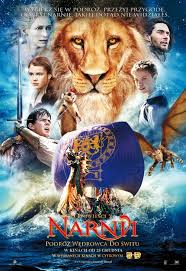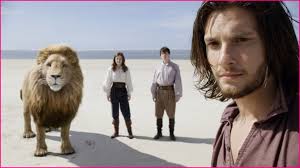When I was a kid, I read the Chronicles of Narnia in order one summer; I remember they were all included in a single, mammoth volume. One of my favorites (aside from the epic The Last Battle) was Voyage of the Dawn Treader, the fifth book in the series, in which the two younger Pevensie children - Edmund and Lucy - join the ship as it sails to defeat evil and ends up near Aslan's Country. Its also the last book to feature any of the Pevensie children as children, making it a bittersweet goodbye to the characters who started it all. It goes without saying, then, that I was looking forward to the movie version, and, unfortunately, found it equal parts disappointing and engaging.



The film follows Edmund (Skander Keynes) and Lucy (Georgie Henley) as they return to Narnia for a third time, this time bringing their annoying cousin Eustace Scrubb (Will Poulter) with them. They board the Dawn Treader, captained by none other than King Caspian (Ben Barnes), and set sail to investigate the disappearances of Caspian's father's friends. Along the way, they discover that Narnians on the Lone Islands have also gone missing, the result of a green mist that keeps coming. Its up to the Dawn Treader crew to find the seven swords of the lords Caspian is looking for, and defeat the evil that lurks on the Dark Island.
Between the second Narnia film, Prince Caspian, and this one, a lot of behind-the-scenes changes have occurred. When Caspian didn't make much money back in 2008 (and seeing that it came out between two of the year's biggest films, Iron Man and Indiana Jones and the Kingdom of the Crystal Skull, that's not too surprising), Disney sold the franchise to 20th Century Fox, which produced this installment. The director of the previous two films, Andrew Adamson also left, with Michael Apted (best known for his 7 Up documentary series and James Bond film The World Is Not Enough) taking the reigns.
The film seems to suffer from this change of direction. Apted's decision to use a handheld camera for most of the film is weird, since it doesn't add much to the film except for the storm scenes on the ship. Its also significantly shorter than the two previous films, and it shows seeing as how the film seems to be missing important parts of the story. There's no time for character development or beneficial pacing in the story; the film skips from beginning to middle to end, shoving character arcs into one-or-two-minute scenes, if at all. Worst of all is Eustace: Poulter's appropriately annoying, with a Holly Hunter-doing-a-Cockney-accent voice, but his transformation into nobility is so rushed that it doesn't give the appropriate impact.
The film also hammers home the Christian undertones more than the previous films; I have nothing wrong with said undertones, since the books were a Christian allegory, but with such unsubtle lines as "We have nothing if not faith," it comes off as more preachy. Rule number one of cinema: show, don't tell, and this film breaks that rule in this regard. Honestly, the film series has always worked best when it works as a fantasy tale, focusing on those elements and letting other themes come from within them, and this film seems to have forgotten that.
The film finally kicks into gear in its second half, when the wheels stop spinning and the quest really begins. Though the action doesn't match that of the epic battles of the first two films, the showdown with a sea serpent in the Dark Island is an exciting piece that works well. And Tilda Swinton (or at least a digital image of her) shows up as the White Witch, and seeing Swinton in anything is always its own reward. And the scene at Aslan's Country is genuienely bittersweet and almost touching, finally capturing the magic that Narnia has promised.
Narnia has always received from some bad knocks as a fantasy series, namely because it came out in the wake of the Godfather of fantasy films: the Lord of the Rings trilogy. As a result, Narnia's been called a LOTR knockoff, but take a look at the films without that context and you can see the groundwork for a terrific fantasy series in its own right. I personally enjoyed the first two Narnia films, which makes me sad that this one didn't work. Given its paltry opening weekend and the previous film's financial hardship, the future of the franchise seems to be in danger (IMDb still lists The Silver Chair, based on the sixth book, as in development). Voyage of the Dawn Treader seemingly tries to fix the "problems" of the first two films, but instead just ends up being the most disappointing entry in the series.
Comments